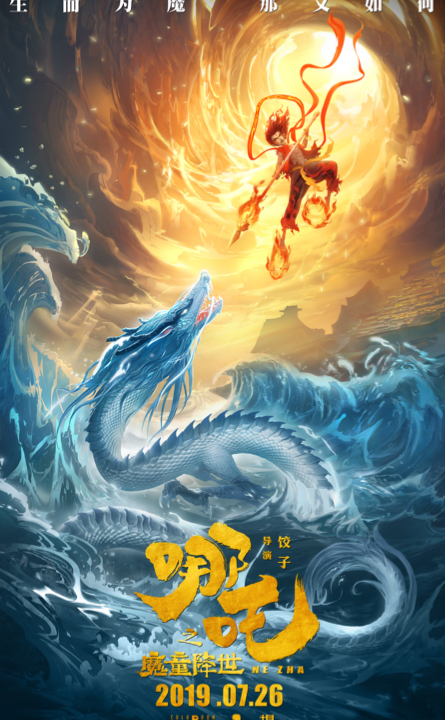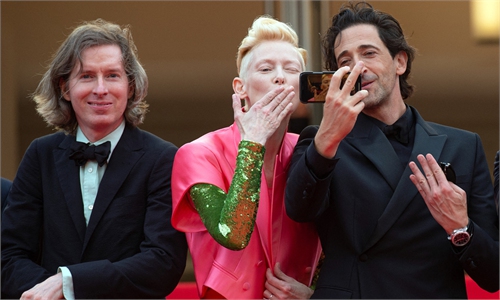ARTS / FILM
Sequel planned for China’s top-grossing animated film, ignites expectations for quality titles
Gods of the box office

Promotional material for Ne Zha Photo: IC
A sequel to the 2019 box office hit Ne Zha is on the way. The first Ne Zha became China's top-grossing animated film to date, generating a whopping 5 billion yuan ($748.99 million).
News of the sequel broke via a monthly bulletin on new film projects that had recently registered with the China Film Administration (CFA). It soon made headlines on social media platforms, igniting people's expectations for more quality domestic animated titles.
A hashtag about the sequel has generated 110 million views on the microblogging site Weibo since Friday last week, with netizens excited to see the young hero on the big screen again.
Ne Zha, loosely based on the tale of a mythological figure of the same name from the Ming Dynasty (1368-1644) novel Fengshen Yanyi, or The Investiture of the Gods, was directed by Yang Yu, a medical school graduate-turned-animator and director who goes by the nickname Jiaozi.
In stark contrast to previous TV drama and film adaptations of the character in both personality and appearance, Yang's version of Ne Zha was depicted as a lovably defiant underdog who has to overcome prejudice and his dark fate to become a hero.
The innovative take hit Chinese theaters in late July, 2019, in the middle of a usually busy three-month summer movie-going period, and became the yearly top earner. It remained the second highest-grossing movie of all time at China's box office, after the 2017 action hit Wolf Warrior 2, for more than a year, until being overtaken by comedy Hi, Mom and war film The Battle at Lake Changjin in 2021.
The huge success made Yang an overnight celebrity and inspiration in China.
According to the bulletin, Yang, who co-wrote the screenplay of the first movie and directed it, is also credited as the sequel's writer.
The new film will be co-produced by Chengdu Coco Cartoon and a Chengdu-based animation studio of Beijing Enlight Pictures - the main production company behind Ne Zha.
There is currently no official word on the release date, but Douban has put it down for 2024. In the sequel, Ne Zha's teacher will be faced with the tall task of reconstructing the bodies of Ne Zha and Ao Bing, son of the Dragon King, directly following the events of the 2019 film.
Ne Zha brought more hope to the Chinese animated filmmaking industry after the market had long been occupied by small-budget films for the underage, with only a few animation films aimed at adults.
Noticeable strides
After being postponed by the COVID-19 pandemic for months, Jiang Ziya: Legend of Deification, a much-anticipated animated feature about the eponymous hero from The Investiture of the Gods, premiered in October 2020. The Enlight Pictures film completed its box-office run with 1.6 billion yuan, becoming the third-highest earner of the year.
Light Chaser Animation, a Chinese studio best known for producing the 2019 animated fantasy White Snake, presented a sequel White Snake 2: The Tribulation of Green Snake in the summer of 2021, which grossed 580 million yuan. Both titles were loosely based on the legend of the White Snake.
New Gods: Nezha Reborn, the Light Chaser Animation version of the same hero from the same book that inspired Ne Zha, also won critical acclaim and garnered 456 million yuan following its release in February 2021. The film is also available outside China through Netflix.
In April, the company announced the second installment of its "new gods" animated film series - which is known in Chinese as Xin Shen Bang: Yang Jian, literally meaning New God List: Yang Jian in English - is set for release in July 2022. The upcoming film revolves around Yang Jian, a mythological figure who, just like Ne Zha before, is also from The Investiture of the Gods.
In an interview with the Xinhua News Agency, Yin Hong, vice chairman of the China Film Association and a professor at Tsinghua University, hailed the progress.
Yin expects Chinese animated films to "achieve a breakthrough in communicating Chinese culture to the rest of the world," noting "a unique art style of Chinese animation in the making, which breaks away from the old style of Hollywood or Japanese animation."
Xinhua



